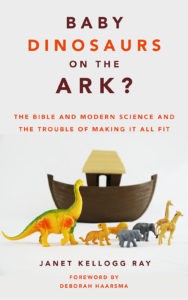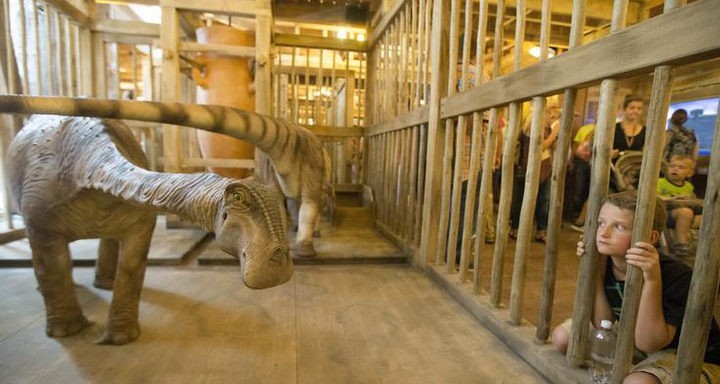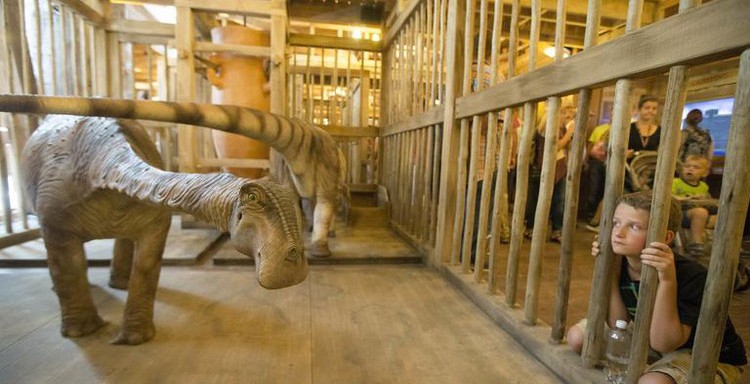With their fundamental denial of evolutionary science, young earth creationists helped set the stage for the evangelical rejection of vaccines and mask-wearing to combat COVID-19, college biology teacher and Christian Janet Kellogg Ray said.
“We are without a doubt reaping the consequences of decades of telling Christians they can’t believe scientists, that scientists are hiding evidence, that scientists can’t be trusted and that you must always pick your faith over the science,” said Ray, author of a new book, Baby Dinosaurs on the Ark?: The Bible and Modern Science and the Trouble of Making It All Fit.
Decades spent viewing science with suspicion, if not with outright hostility, also influenced some Americans to embrace unsafe vaccine alternatives, including the anti-parasite medication Ivermectin, as a treatment for COVID-19, she said.

Janet Kellogg Ray
“The evangelical Christian fear of masking and vaccines is a mystery until you take that Venn diagram and see the overlap between evolution deniers and people taking Ivermectin and thinking the vaccine threatens lives or that masking is the government forcing them to do things against their will.”
Ray teaches evolutionary science as an adjunct biology professor at the University of North Texas, but she is no stranger to the creationist worldview.
“I grew up in a very conservative — you could even say fundamentalist — wing of the Restoration movement in which we would no more question Genesis than we would question the existence of Jesus,” she explained. “Creationism was an absolute.”
Any perceived challenges to those beliefs from science would be immediately dismissed, she said. “We would have said something like, ‘We certainly didn’t come from monkeys.’ It’s not that I recall a lot of harping on this, but it was just a given.”
A growing attraction to biological science eventually led her to discern that evolution underlies all life but without threatening her faith as creationists told her it would.
Young earth creationists helped set the stage for the evangelical rejection of vaccines and mask-wearing to combat COVID-19.
“Evolution says nothing about God or religion,” she noted. “I am still a very active follower of Jesus.”
But the creationist position grew in apparent sophistication in recent years, especially among those who believe in the most literal biblical interpretations.
“Young earth creationism holds that the universe and all creation is somewhere between 6,000 and 10,000 years old, and that everything in the cosmos was specially created in an instant according to a literal reading of Genesis. Anytime there is a conflict between scientific evidence and the literal reading of Genesis, the tie always goes to Genesis,” she said.
Not all creationists hold that position, Ray added. “Old earth creationists accept the ancient age of the earth and universe, often explaining that the days of creation covered eons of time. Some will allow for a time before the Eden story.”
But both camps share one important characteristic, she added: “All scientific evidence has to be interpreted through a Bible lens.”
After the U.S. Supreme Court ruled in 1987 that creationism (and its inherent rejection of evolution) is based on religious beliefs and could not be taught in isolation in public schools, the intelligent design movement arose as a more palatable alternative, Ray explained. “This model of creationism is a lot more scientific sounding because it uses more technological language. But the bottom line is that it’s all the same — evolution is rejected in favor of some sort of miraculous intervention.”
All forms of creationism foster fear of evolution and distrust of scientists.
All forms of creationism foster fear of evolution and distrust of scientists for either misinterpreting the fossil record or intentionally distorting the truth about it, Ray said. “But it’s not evolution deniers’ science that is the problem, it’s their theology.”
That theology is tied to belief in the biblical Adam as a single historical figure whose validity is undermined by evolutionary science, she said. “If Adam is not a literal human being and not literally the first man, to them there is no need for Jesus, there’s no need for the gospel and the whole thing falls to the ground.”
Fear and distrust of science result when adherents to the doctrine cannot picture how faith and evolution can co-exist, Ray said. “When you boil it down, their theology makes Adam the foundation of the gospel, not Jesus. It appeals to a lot of people of faith because they don’t want to write God out of the picture, and they want to find a place for God in creation.”
The pandemic-era rise of conspiracy theories and efforts to vilify infectious disease experts like Anthony Fauci, director of the National Institute of Allergy and Infectious Diseases, are a spillover from efforts to undermine evolution, Ray said.
 “If you think scientists are hiding evidence for creationism and design, and you see the same verbiage in the pandemic, that tells you something,” she continued. “We have people asking questions like ‘Why are you not telling us the real story about Ivermectin? It’s because you want to push your vaccine.’”
“If you think scientists are hiding evidence for creationism and design, and you see the same verbiage in the pandemic, that tells you something,” she continued. “We have people asking questions like ‘Why are you not telling us the real story about Ivermectin? It’s because you want to push your vaccine.’”
The title of Ray’s book is a reference to the claims of young earth creationists that Noah brought dinosaurs onto the ark, which illustrates the “mental gymnastics that take place when Scripture and science seem to be at odds,” she said.
But the purpose of Baby Dinosaurs on the Ark is to counter these narratives by addressing the false tension between science and faith. “My book is an attempt to demonstrate that a natural process does not exclude God and that you still can be a person of faith and accept the natural process of evolution,” she said.
Related articles:
How the Human Genome Project changed this professor’s reading of Genesis
My journey from being a young-earth Creationist, Dispensationalist Republican to seeing my neighbor as worthy of my vote | Opinion by Rick Pidcock
What about the science, faith and ethics of a coming coronavirus vaccine? |Analysis by Andrew Gardner


